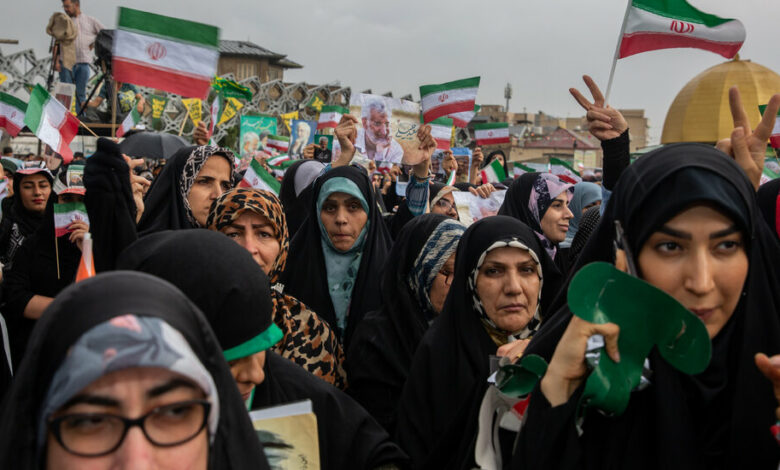Now that dissatisfaction among voters is high, turnout in Iran appears to be falling

As voting in Iran’s presidential election continued on Friday, early estimates from campaign officials showed that only about one in four eligible voters appeared to cast their ballots. The low turnout was a potential blow to the ruling clerics, who made voter participation a sign of their legitimacy and had hoped to reach a rate of 50 percent, compared with 70 percent in previous presidential elections.
After years of economic struggle and severe restrictions on personal and social freedoms, many Iranians say they have grown tired of empty promises from politicians unwilling or unable to deliver on them. For some voters, refusing to vote was the only way to reject the government.
“The disconnect between the government and its people is severe,” said Omid Memarian, a human rights activist and senior analyst at DAWN, a Washington think tank. “From university students to women and political prisoners to those who lost loved ones in the nationwide protests of 2022, there is a consensus that Iran needs much bigger changes than what the regime is proposing.”
“People are sick,” he added, “of choosing between the bad, the worst and the worst.”
In the capital Tehran, reports emerged that some polling stations were deserted. “The polling station where I voted today was empty,” said one woman, Mahdieh, 41, who gave only her first name for fear of the authorities. “I voted without a hijab,” she added, referring to rules requiring women in Iran to wear head coverings.
But in the central and southern parts of the capital, where the government has more voters, voters queued up as polling hours were extended into the evening.
Milad, 22, from Karaj, a city outside the capital, said he had changed his mind about not voting and planned to vote for the reformist candidate, Dr. Masoud Pezeshkian. “Most Iranians are against radicalization and extremism,” he said. “Since we now have a candidate who is following a different path, I want to give him a chance.”
The vote to choose a successor to President Ebrahim Raisi, who died in a helicopter crash in May, comes at a perilous time for the country. The incoming president will face a flurry of challenges, including discontent and division at home, a struggling economy and an unstable region that has brought Iran to the brink of war twice this year.
The final result may not be known until tomorrow, but analysts predicted it would be inconclusive: none of the three main candidates would win the necessary 50 percent of the vote to avoid a runoff.
Pre-election polls by Iranian state television showed votes split evenly between the two conservative candidates, Mohammad Baqer Ghalibaf and Saeed Jalili, both at around 16 percent. The reformist candidate, Dr. Pezeshkian, had about 23 percent. If that remains the case, analysts say, a second election would take place on July 5 between the reformist and the leading conservative.
That outcome could have been avoided if any of the Conservatives had withdrawn. But in a bitter public feud, neither Mr. Ghalibaf, a former commander of the Islamic Revolutionary Guard Corps who is now the speaker of Parliament, nor Mr. Jalili, a hardliner on both domestic and foreign policy, yielded. Of the two, Mr Ghalibaf is seen as the more pragmatic.
In the latest poll, Mr. Pezeshkian had the highest support of any candidate, but still far short of the 50 percent needed to avoid a runoff. Speaking to reporters after casting his ballot in Rey, just southeast of Tehran, Dr. Pezeshkian said: “I came for Iran. I came to speak to the deprived areas and to hear the voices of those who did not get their rights,” according to the state news agency IRNA.
Also running is Mostafa Pourmohammadi, a cleric with former senior positions in the intelligence service, but his candidacy has barely registered with the public and polls show he is likely to win less than 1 percent of the vote. Mr Pourmohammadi had warned during his campaign that the Islamic Republic had lost its people and that its turnout would be a major challenge.
Polls opened at 8 a.m. local time on Friday and were expected to continue well into the night to encourage greater turnout.
In the run-up to the election, Iranian leaders, from Supreme Leader Ayatollah Ali Khamenei to top commanders of the Islamic Revolutionary Guard Corps, had described the vote as an act of resistance against Iran’s enemies and an affirmation of the rule of the Islamic Republic.
Casting his vote as the polls opened on Friday morning, Mr Khamenei urged Iranians to vote for the good of the country, regardless of who they supported. eyes of the world.
“This is a big political test for the nation, and I know some people are suspicious and haven’t decided what to do,” he said. “But I can tell them it’s important, it has a lot of benefits, so why not?”
But his pleas apparently fell on deaf ears. Iranian elections are tightly controlled, with a committee of appointed clerics and lawyers vetting all candidates and extensive government efforts to intimidate opposition voices in the news media. And virtually all major state decisions in Iran are made by Mr. Khamenei, especially in the areas of foreign and nuclear policy.
As a result, many Iranians appear to have continued the boycott that began with the last major election, either in protest or because they do not believe that meaningful change can happen through the ballot box.
Four young women studying psychology at the University of Tehran who were shopping for makeup at the Tajrish Bazaar in northern Iran on Wednesday provided a taste of that discontent. Although they described themselves as upset about conditions in Iran, they said they had no plans to vote.
“We can’t do anything about the situation; we have no hope except in ourselves,” said Sohgand, 19, who asked not to be identified for fear of authorities. “But we want to stay in Iran to make things better for our children.”
She wore well-cut black pants and a fitted jacket and left her brown hair uncovered. But she also had a scarf draped around her shoulders in case an official told her to put it on. As for the rules requiring women to wear a hijab, she simply added: “We hate it.”
On Friday, the mosaic-covered Hosseinieh Ershad, a religious institution in Tehran, was packed in the afternoon with people queuing to cast their votes.
Among them was Neema Saberi, 30, who said she supported the reformist Pezeshkian. “We believe that everyone will be united by Mr. Pezeshkian,” he said. “He is a logical person, he is not an extremist and he respects people from all walks of life.”
Mr. Saberi, along with others at the institute, emphasized that they appreciate Mr. Pezeshkian’s commitment to tackling corruption and having “better relations with the world.” This is a commonly used euphemism for easing tensions with the West to get sanctions lifted.
Televised debates, in which the candidates were surprisingly outspoken in rejecting the status quo, showed that the economy, plagued by U.S. sanctions, corruption and mismanagement, was a top priority for voters and candidates, analysts said.
There can be no economic recovery without addressing foreign policy issues, analysts say, including the standoff with the United States over Iran’s nuclear program and concerns about Iran’s military involvement in the region through its militant proxy network -groups.
“Rather than radical changes, the elections could trigger smaller, albeit significant, shifts,” said Vali Nasr, professor of international affairs and Middle East studies at the Johns Hopkins University School of Advanced International Studies in Washington. “Voices at the helm who want a different direction could push the Islamic Republic to back away from some of its positions.”
While apathy remains high in most urban areas, voters in provinces with significant ethnic Azerbaijani and Kurdish populations were expected to turn out in greater numbers for Dr. Pezeshkian. An Azerbaijani Turk himself, he was a member of parliament for the city of Tabriz, an important economic hub in the northwestern province of East Azerbaijan. Dr. Pezeshkian has made campaign speeches in his native Turkish and Kurdish.
At a rally in Tabriz on Wednesday, the doctor was welcomed by a folk hero, with crowds filling a stadium and singing a Turkish nationalist song, according to videos and news reports. Ethnic and religious minorities are rarely represented in high-ranking positions in Iran, so the candidacy of one for the presidency has sparked regional interest and enthusiasm, Azerbaijani activists say.
Leily Nikounazar contributed reporting from Tehran.




